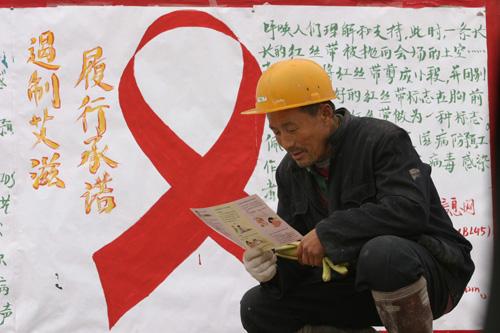| Videos | • Latest |
|
• Feature | • Sports | • Your Videos |
Sex education urgent for migrant workers

 0 Comment(s)
0 Comment(s) Print
Print E-mail
CNTV, August 26, 2011
E-mail
CNTV, August 26, 2011
Migrant workers, the pillar of China's urbanization, are the weak link in the country's efforts to contain HIV/AIDS. Statistics from the Ministry of Health indicate that migrant workers account for a growing percentage of new HIV infections nationwide, due to their lack of knowledge on the prevention measures.
 |
|
Migrant workers comprise a high-risk group in the spread of HIV/AIDS. The growing infection rate of this group makes sex education an urgent, long-term mission. |
Mr Duan is twenty nine year old, and was diagnosed with HIV five years ago. It was then that he went through what he calls the "darkest period of his life". Duan remained gloomy for half a year before seeking treatment.
Mr Duan, HIV/AIDS carrier, said, "I had little knowledge about the disease and never thought I could catch it. So when my HIV test result came out positive, I was taken aback. I thought I was going to die very quickly. "
Working a variety of jobs in sales and the service industry, Duan is among the new generation of migrant workers who set off for the big cities in search of a better life.
They work long hours for a meagre income. And with few options for entertainment, young migrant workers often fall victim to their baser instincts, without being aware the risks.
Mr Yang is twenty three years old and contracted the virus through passionate fling last year. He's now learning to live with the disease. Mr Yang, HIV/AIDS carrier, said, "Being an HIV carrier does not mean that I'm a promiscuous person. I'm not. But it's useless to whine about it either. I now work as a bar tender and earn a stable income."
In Beijing, sexual transmission has topped intravenous drug usage as the most common way in which the disease is transmitted since 2008.
Migrant workers comprise a high-risk group in the spread of HIV/AIDS. A recent survey indicates that over forty percent of them don't know how to use a condom, and an even higher percentage had no idea how the virus is transmitted. The growing infection rate of this group makes sex education an urgent, long-term mission.
Public condom machines have been installed on street corners, in hotels and karaoke bars. But despite their easy availability in recent times, China's condom problem is far more complicated.
Beijing's You'an Hospital treats three thousand HIV/AIDS patients every year. But according to doctor Guo Caiping, an additional five hundred new cases crop up every year, mostly through unprotected sex.
Guo Caiping, infectious disease director of You’an Hospital, said, "What we are doing now is altering the mindset. Most people, even when they are aware of the danger, reject safety measures in their daily lives. So, what we should be doing is continuing to spread knowledge on prevention measures, and most importantly, their daily application."
Duan and Yang have to live with the disease. They have replaced initial disbelief and rejection with a more positive outlook on life. Duan manages an online shop, while Yang dreams of becoming a makeup artist. Their road ahead will not be an easy one, but they've developed the will to carry on.






Go to Forum >>0 Comment(s)